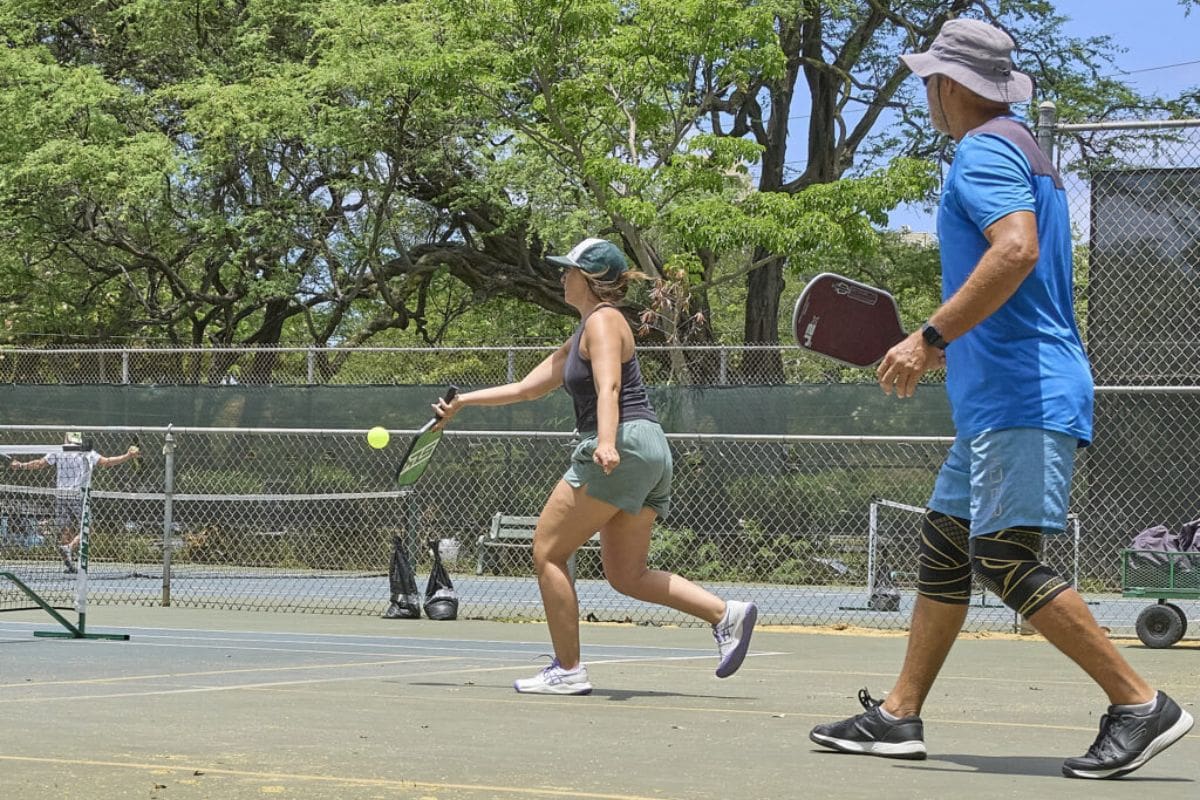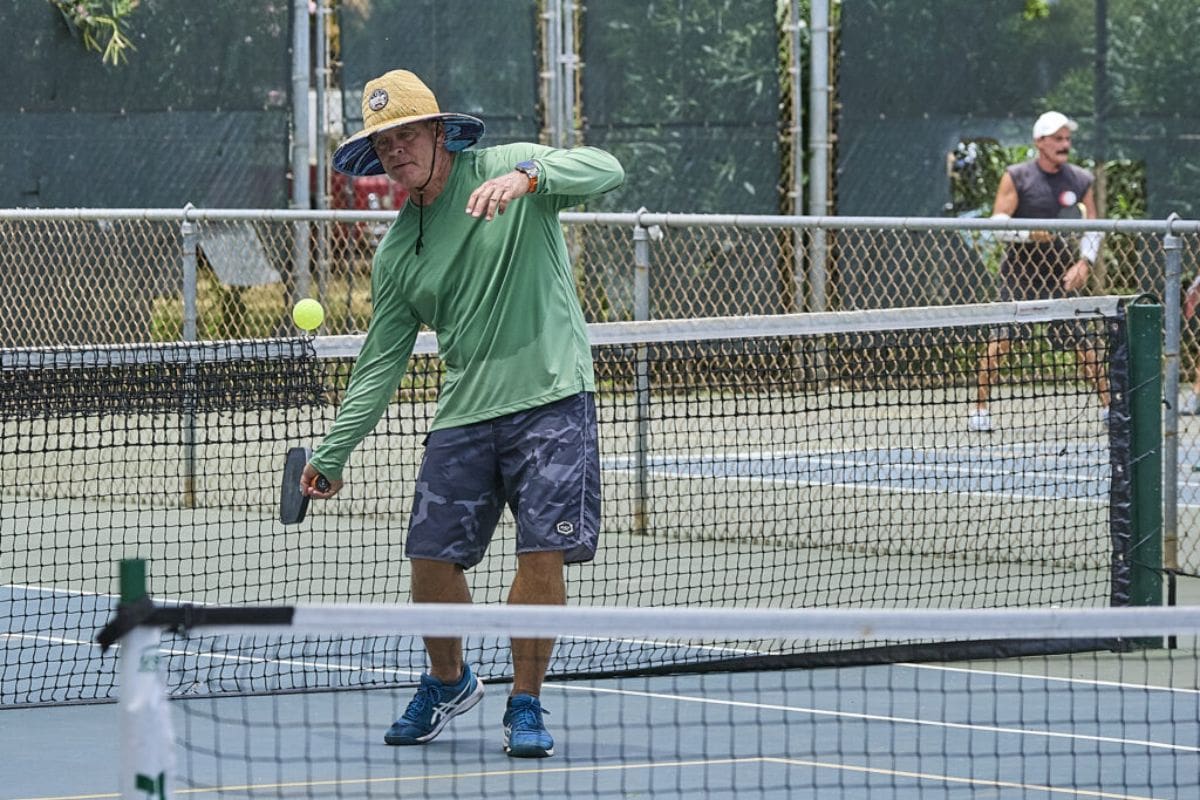Hawaii’s Pickleball Noise Controversy: The explosive rise of pickleball, which surged in popularity during the pandemic, is now causing unexpected strife in Hawaii neighborhoods. Sande Lew, an early enthusiast who introduced pickleball to her Princeville community, now regrets her enthusiasm.
The constant noise from the sport, which seemed innocuous at first, has grown unbearable for some residents. With over 13.6 million players in the U.S. last year alone, the clamor surrounding pickleball is drawing increasing complaints and tensions.
Sande Lew mentioned: “It was never quiet, It was from when the park opened to when it was beyond dark at night, and there were no constraints.”
Hawaii’s Pickleball Explosion
Hawaii, with its 99 pickleball locations and 376 courts, reflects the nationwide craze for the sport. Bob Lew, a board member of the Oahu Pickleball Association, attributes the boom to the pandemic’s social distancing restrictions. For many, pickleball became a crucial social outlet during lockdowns.
“When people were hit with Covid and they couldn’t interact, they did find an outlet in pickleball,” Bob Lew Mentioned. “I think that was the catalyst that made it just go wild.”
Mei Kanada, a pickleball player from the Big Island, highlights the sport’s appeal, its ease of learning and suitability for various ages and skill levels. Despite its positive attributes, the sport’s rapid expansion has brought with it a new set of challenges.
“Even though it’s for old people, I appreciate that it’s easy for anyone to pick up, It’s more of a social sport, and it allows those skills and technique barriers to be a little lower.”
-( Mei Kanada )
Local Discontent: Noise Complaints and Legal Ramifications
Residents like Danny Lauer, living near pickleball courts in Kihei, Maui, find the incessant noise overwhelming. Lauer describes the constant pop-pop-pop of the game as akin to living near a shooting gallery within an amusement park. With noise levels reaching up to 65 decibels, the sound often crosses into the range of human sensitivity, aggravating the community. “I always tell people that I live next to a shooting gallery inside an amusement park,” he mentioned. “People are laughing and yelling and screaming, and then you hear this pop-pop-pop, for eight to 10 hours.”

Sande Lew’s own neighborhood faced similar issues, leading to a temporary ban on pickleball. Such disputes have raised questions about legal recourse for affected residents.
Navigating Legal and Practical Solutions
Hawaii Department of Health’s Shawn Haruno acknowledges the complaints but notes that recreational noise is generally outside their jurisdiction.
Legal expert Denise Antolini suggests that residents might pursue public nuisance claims against city-owned facilities if they can document significant personal harm. Suing private court operators, however, could be more complex due to existing permit regulations.
Nathan Serota from the Honolulu Department of Parks and Recreation emphasizes the challenge of balancing recreational needs with noise concerns. He advocates for exploring sound mitigation options but notes that cost-effectiveness remains a significant barrier. “A lot of recreational uses are going to generate noise,” Serota noted. As stakeholders seek to address the issue, finding common ground may be key.
Regarding sound mitigation measures such as barriers or quieter equipment, Serota explained that the primary concern is cost-effectiveness.
“It’s just a matter of would we be able to fund it,” he mentioned. “If there’s a push for one group to look at a particular area and to test these things out, we’d be all for hearing their proposal.”
As the debate over pickleball’s impact continues, Mei Kanada reflects on the sport’s paradoxical nature.
“Pickleball has power,” Kanada remarked. “It brings people together, but it tears people apart.”
Finding Common Ground
The pickleball controversy shows a broader challenge: balancing a beloved sport’s growth with the needs of local communities. While some propose site relocations and restricted hours, achieving harmony between enthusiasts and residents remains an ongoing struggle. As Bob Lew and others suggest, the key may lie in fostering better understanding and cooperation among all parties involved.

News in Brief: Hawaii’s Pickleball Noise Controversy
The rise in pickleball’s popularity, fueled by the pandemic, is creating discord in Hawaii neighborhoods. Sande Lew, who initially championed the sport, now regrets her enthusiasm due to constant noise disruptions. With 13.6 million U.S. players last year, complaints about the noise are increasing.
Residents like Danny Lauer describe the sound as overwhelming, comparable to a shooting gallery. Legal experts suggest potential public nuisance claims, though navigating them can be complex. Officials, including Nathan Serota from Honolulu’s Parks Department, are exploring cost-effective sound mitigation.
Also read: The Picklr Launches New Location in McKinney

